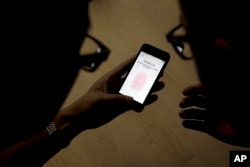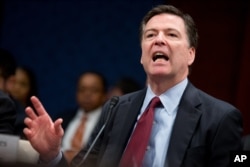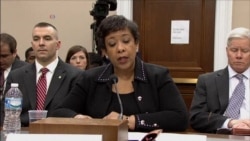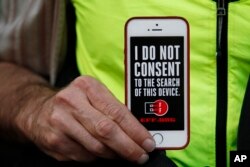In defying the U.S. government’s demands to help it break into a locked iPhone, Apple Inc. and its chief executive have added another chapter to the tech company’s lore. The move has amplified its role, not only as an innovator of computing and communications, but also as a global guardian of privacy and security – and created a complicated challenge.
The standoff represents the “hardest question I’ve seen in government,” FBI Director James Comey told a congressional committee on Thursday.
“This case is not about one phone. This case is about the future,” Apple CEO Tim Cook told ABC News in an exclusive television interview that aired Wednesday. “What is at stake here is: Can the government compel Apple to write software that we believe would make hundreds of millions of customers vulnerable around the world, including the U.S., and also trample civil liberties that are at the basic foundation of what this country was made on?”
The phone in question allegedly belonged to Syed Farook, who, with his Pakistan-born wife, went on a terrorist shooting spree last December that left 14 of his co-workers dead in San Bernardino, California. Last week, a federal judge ruled that Apple engineers must develop custom coding to break the company’s proprietary auto-destruct security system.
Apple has refused. While Cook expressed sympathy for the victims, he explained that compliance would endanger consumer trust – a cornerstone of one of the world’s most profitable companies – and, more important, could jeopardize civil liberties and even lives.
"If a court can ask us to write this piece of software, think about what else they could ask us to write – maybe it’s an operating system for surveillance, maybe the ability for the law enforcement to turn on the camera," Cook told ABC. "I don't know where this stops; but, I do know that this is not what should be happening in this country."
Apple says the FBI has asked it to unlock more than a dozen iPhones in the last five months, reinforcing its argument that the FBI's current request will lead to further demands.
Concern over future demands
Cook, in a February 16 letter to Apple customers, wrote that "compromising the security of our personal information can ultimately put our personal safety at risk. That is why encryption has become so important to all of us."
Comey, testifying Thursday before the U.S. House Intelligence Committee, questioned whether the benefits of "universal strong encryption" outweigh the risks.
"I love encryption, I love privacy," Comey said. But he added that law enforcement "really does save people's lives, rescue kids, rescue neighborhoods from terrorists and we do that a whole lot through court orders that are search warrants and we do it a whole lot through search warrants of mobile devices. So if we move to a world where that is not possible anymore, the world will not end – but it will be a different world than where we are today."
Apple is expected to file an objection to the order by Friday, the Associated Press reported.
On Wednesday, U.S. Attorney General Loretta Lynch told a congressional committee that there’s a precedent to back the government's request.
"It's a long-standing principle in our justice system that if an independent judge finds reason to believe that a certain item contains evidence of a crime, then that judge can authorize the government to conduct a limited search for that evidence," she said. "And if the government needs the assistance of third parties to ensure that the search is actually conducted, judges all over the country and on the Supreme Court have said that those parties must assist if it is reasonably within their power to do so."
Apple prepares for legal battle
Cook told ABC on Wednesday that Apple was willing to take its fight to the nation’s highest court. The Washington Post notes the company already has lined up a former U.S. solicitor general, Ted Olson, who’s experienced in Supreme Court litigation. Olson has written in support of journalists protecting their sources, and he successfully challenged California’s ban on same-sex marriage.
Among the organizations pledging to aid Apple’s legal fight is the American Civil Liberties. "This is an unprecedented, unwise and unlawful move by the government," staff attorney Alex Abdo commented last week.
While on the presidential campaign trail last week, billionaire Republican candidate Donald Trump called for a boycott of Apple products – iPhones, iPods, iPads, Macbooks and more.
Divided public opinion
The American public is split on whether Apple should comply.
A Pew Research Center poll released Monday indicated a slight majority of Americans – 51 percent – believe Apple “should unlock the iPhone to assist the ongoing FBI investigation.” Another 38 percent say it shouldn’t, suggesting an obligation to protect its other users’ information.
A Reuters/Ipsos poll released Wednesday found that nearly half of Americans (46 percent) support Apple’s position and a third (35 percent) disagreed. Reuters noted that other questions in the poll indicated “that a majority of Americans do not want the government to have access to their phone and Internet communications, even if it is done in the name of stopping terror attacks."
Some Apple supporters have taken to the street, holding rallies – organized by the group Fight for the Future – in at least 30 American cities as well as outside FBI headquarters.
Others have shown solidarity online and in other media. The Electronic Frontier Foundation, a nonprofit organization supporting civil liberties, encouraged broad resistance "to this half-baked and ill-advised judicial command" by "raising your voice through every channel available."
No matter the outcome, the fight definitely is raising Cook’s and Apple’s profile, Geoff Colvin wrote in Fortune, as the Washington Post cited.
"Cook has chosen to put himself and Apple at center stage on an issue of central importance to the technology industry, criminal justice, and society, with no assurance of where this choice will lead," Colvin wrote. "He apparently just believes it’s time this issue got confronted head-on. That’s leadership behavior, and whatever the outcome, it elevates Apple’s status."
VOA's Doug Bernard and Jeff Custer contributed to this report.

















